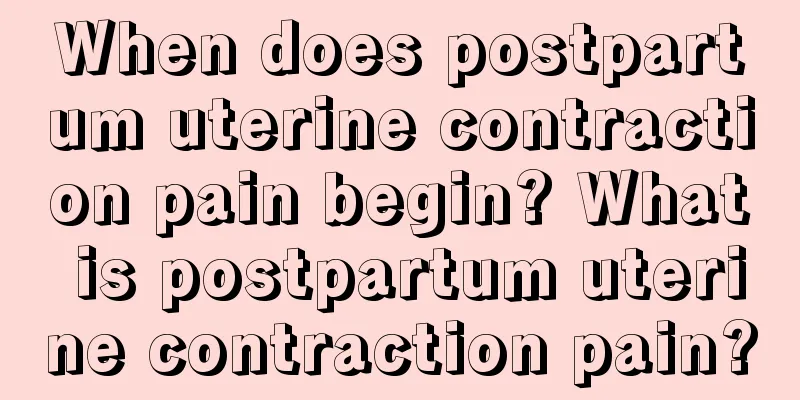When does postpartum uterine contraction pain begin? What is postpartum uterine contraction pain?

|
Postpartum uterine contraction pain is a very normal phenomenon. Many pregnant women will experience this phenomenon a few days after giving birth, because the uterus needs to shrink back to its normal size after giving birth. So we need to understand when postpartum uterine contraction pain begins? What is postpartum uterine contraction pain? When do postpartum contractions begin?Whether it is a caesarean section or a natural birth, every pregnant woman will have irregular uterine contractions after giving birth. The degree of pain during uterine contractions is related to personal sensitivity. Some people find it unbearable, but some people may not feel it. Postpartum uterine contractions will disappear within 2-3 days, and a few will last more than 10 days. Pregnant women restore their normal size through postpartum uterine contractions before pregnancy, and this process will cause this contraction pain. This uterine contraction pain will manifest within 1-2 days after delivery. You can adjust your sleeping position, avoid sitting for a long time, rest in bed, massage your lower abdomen appropriately, and use a hot water bottle to relieve the pain. Wait for the auxiliary tool to heat the lower abdomen for a little longer. If you can hold on for a few days, it will help. Uterine contractions will last about 3 days after caesarean section. If the mother has been suffering from abdominal pain, she should go to the hospital to ask the doctor for the specific reason. Understand the information of the disease clearly, so that you can truly control the uterine contraction pain. If the uterine contraction pain is in the later stage, it often takes several months to relieve at this time, so if you want to control the disease earlier, it is recommended to pay attention to it in the early stage and go to a regular hospital for treatment in time. What is postpartum uterine contraction painWomen will experience postpartum uterine contraction pain after giving birth, and this situation will become more obvious with breastfeeding. This is the severe pain in the lower abdomen that occurs during the puerperium. In this case, women who have given birth often experience obvious pain. 1. Generally, after giving birth, the uterus and the navel are level on the first day, and then they will drop every day until the uterus drops to the normal position. Then, the uterine contraction pain disappears at this time. During breastfeeding, it will stimulate the contraction of the uterus, so this has a good stimulating effect on the recovery of the uterus. Generally, breastfeeding is advocated after childbirth, which is conducive to postpartum recovery. 2. Most uterine contractions are normal physiological reactions, because they will not last long. As the uterus gradually returns to its original position, the contractions will gradually decrease and the pain will disappear. Therefore, this can be cured directly without external interference. If there are abnormal uterine contractions, such as too frequent contractions, which have not stopped for a long time, then at this time, it is necessary to check to see if there is a problem somewhere, and timely treatment is required to prevent uterine bleeding. 3. Postpartum uterine contraction pain will cause pain to the mother. Childbirth is already very physically demanding, and this pain will make the mother's mood even worse. Therefore, at this time, family members must accompany the mother to help relieve the pain and avoid depression in the mother. Can I take painkillers for postpartum contractions?It is best to use hot compresses to relieve the pain of postpartum contractions, because the baby needs to be breastfed. Taking painkillers only temporarily relieves the pain. As the saying goes, if the flow is smooth, there is no pain, and if there is pain, the flow is blocked, so relieving the pain is the fundamental reason. Moreover, taking painkillers is addictive, so medicine is three-point poison. After becoming a mother, it is not recommended to use any medicine when considering postpartum breastfeeding. Postpartum contractions are actually expelling lochia from the body. After the lochia is discharged, the postpartum contractions will decrease accordingly and disappear. Therefore, postpartum contraction pain is actually caused by the incomplete discharge of lochia. Eat less greasy food and drink brown sugar water appropriately. Can rubbing the belly relieve postpartum contractions?After childbirth, since the fetus has been discharged from the uterine cavity, the volume of the uterus has been significantly reduced. During the recovery process of the uterus, obvious uterine contractions will occur. This type of uterine contraction is a normal uterine contraction and is beneficial to the recovery of women's bodies. Uterine contractions often cause obvious pain. For postpartum uterine contraction pain, you can gently rub your belly to relieve the pain. Gently rubbing your belly can reduce the pressure and pulling caused by uterine contractions, weaken the intensity of uterine contractions, and help discharge the accumulated blood in the uterine cavity, so it is beneficial to women's postpartum recovery. However, you must not use too much force when rubbing your belly. Excessive force will increase the pain and cause obvious local irritation, such as nausea, vomiting and other discomforts. Therefore, you can gently rub your belly during postpartum uterine contractions, which will help relieve clinical symptoms. |
>>: The harm of painless childbirth injections and painless childbirth experience
Recommend
What should children eat to grow taller? Scientific methods for children to grow taller
Although height is mostly determined by the heigh...
How many days after IVF transfer can pregnancy be detected? Diet chart after IVF transfer
IVF can effectively help infertile couples concei...
Do babies need pillows? At what age can babies use pillows?
At what age can babies use pillows? Adults cannot...
Can pregnant women wear bras? What kind of bras should pregnant women wear?
After a woman becomes pregnant, for the sake of h...
What is the difference between amino acid milk powder and deep hydrolyzed milk powder? Which one is better, amino acid milk powder or deep hydrolyzed milk powder?
The difference between amino acid milk powder and...
Suitable for babies aged 0-1 years old. Introduction of finger nursery rhymes for babies.
What are some children's songs suitable for b...
What are the methods for removing phlegm from infants and young children? Four methods are recommended
Many infants and young children have phlegm in th...
How to clean your baby's belly button and how to care for your baby's umbilical cord
Newly born babies need their parents to take care...
Is it better to have a caesarean section by transverse or vertical section? What is the difference between a caesarean section by transverse or vertical section?
There are two ways for women to give birth: natur...
How to massage infants and young children with abdominal distension? What to do if the baby falls asleep while feeding?
The stomach and intestines of infants and young c...
What is the reason for a child's repeated fever? Is a child's repeated fever cancer?
In autumn and winter, if you don't pay attent...
What should I do if my baby is swollen after being bitten by a mosquito? How to reduce the swelling of mosquito bites
In summer, mosquitoes are rampant. No matter how ...
Is a spoonful of baby milk powder a flat spoon or a full spoon? How many grams does a spoonful of baby milk powder weigh?
When preparing milk powder for babies, there are ...
What causes neonatal eczema? How to treat neonatal eczema?
What should you do if your newborn baby has eczem...
The eldest daughter is jealous of the second child's younger brother being favored. How to appease the eldest child by having a second child?
With the opening of the second-child policy, many...









